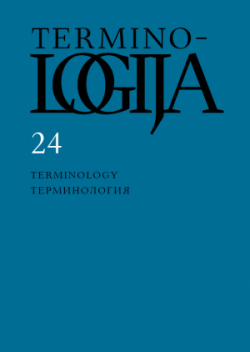Sąvoka lietuvių mokslo kalboje
Sąvoka in Academic Lithuanian
Author(s): Asta MitkevičienėSubject(s): Language studies, Language and Literature Studies, Applied Linguistics, Lexis, Semantics, Computational linguistics, Descriptive linguistics, Baltic Languages, Philology
Published by: Lietuvių Kalbos Institutas
Keywords: term; concept; corpus; academic language; syntagmatic relations; semantic relations; conjunctive usage; contextual synonyms;
Summary/Abstract: The paper deals with the usage of the fundamental term of terminology sąvoka‘concept’ in academic Lithuanian. The research is aimed at establishing the semantic(contextual) partners of this term and its thematic field and to provide an outline of the concept ‘concept’ according to the usage of the term designating it. This is a corpus-based research, the source of which is Lietuvių mokslo kalbos tekstynas CorALit(Corpus of Academic Lithuanian CorALit) (publicly available at http://coralit.lt). Themain methodology of research is semantic analysis of phrases with sąvoka. Conjunctive usage and contextual synonymy of the term sąvoka which reflect paradigmatic relations of this term were also analysed.The lemma sąvoka was found in the corpus of academic Lithuanian CorALit 779times. It is present in texts from all five fields – the humanities, social sciences, natural sciences, biomedical sciences and technological sciences. In this corpus the term sąvokais one and a half times more frequent than the terminology term termin as ‘term’.In academic Lithuanian the term sąvoka has attributes and is an attribute itself, it is also used as an object or subject and only sometimes as a predicative or adverbial modifier.Attributes describe term sąvoka according to name, space, action, content feature,other evaluating feature, time, place, author, language, object, etc. As an attribute term sąvoka is a secondary name, also a possessor or constituent and more deeply –object or subject of an action or a state, etc.As can be judged from objective phrases a concept is an object of usage, thinking,cognition and perception as well as research, linguistic activities and expression. It is being looked for, found, obtained, given, introduced or eliminated, legitimatized,changed or some other actions are performed in its respect. Besides that, a concept is a result as well as an instrument – not only of an intellectual activity, but also, according to the data of the corpus researched, an instrument of expression. Thus, the features of a term are ascribed to a concept.A concept as a subject includes, has or receives something, it changes something or experiences a change, takes place in space, performs a function or random actions, is in various states, is of some quality or is something, and rarely – simply exists.It can be observed from the conjunctive usage of sąvoka that its correlates are units of expression (including the term terminas), general terms of science and other abstract nouns, names of mental formations and parts or aspects of a concept.The terms sąvoka and terminas are used in academic Lithuanian not only in conjunction,but also as contextual synonyms. The usage of terminas instead of sąvokacould be seen as metonymy. Contextual synonymy of terms can be justified only if it doesn’t affect precision and clarity.Inaccurate usage of terms in texts distorts the results of research; therefore conclusions about the true meanings of terms and concepts named using these terms cannot be drawn solely on the basis of term usage in texts.
Journal: Terminologija
- Issue Year: 2017
- Issue No: 24
- Page Range: 94-126
- Page Count: 33
- Language: Lithuanian

